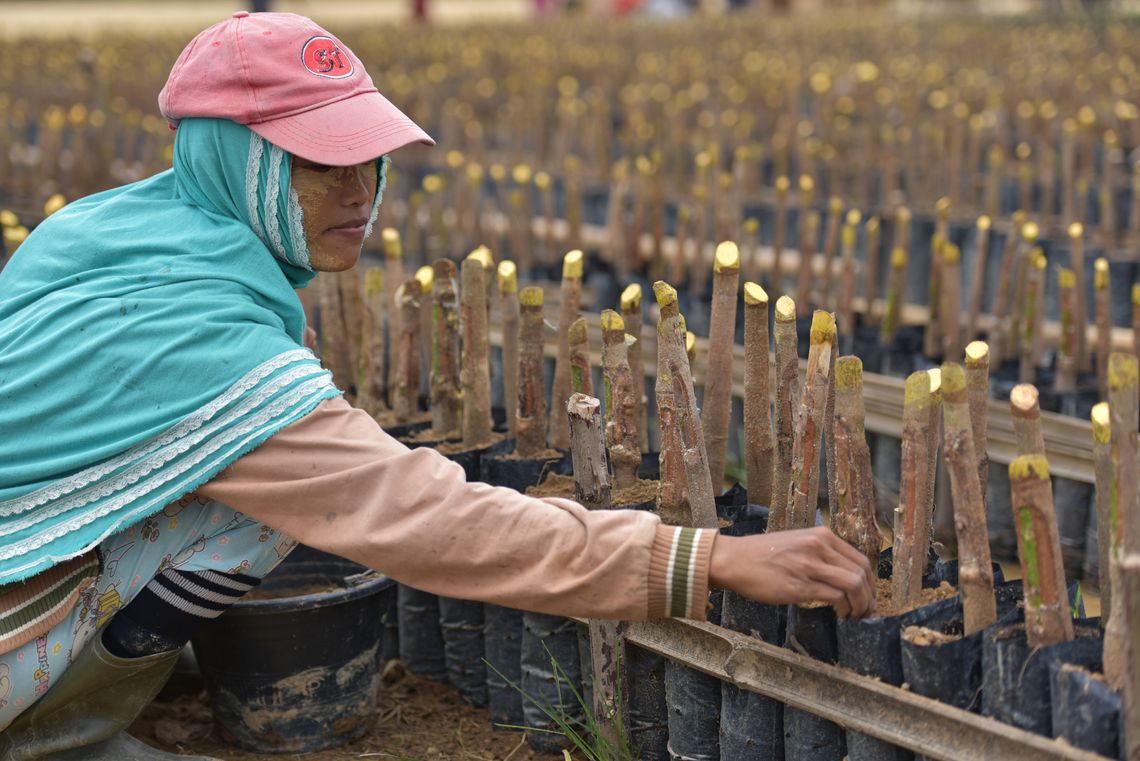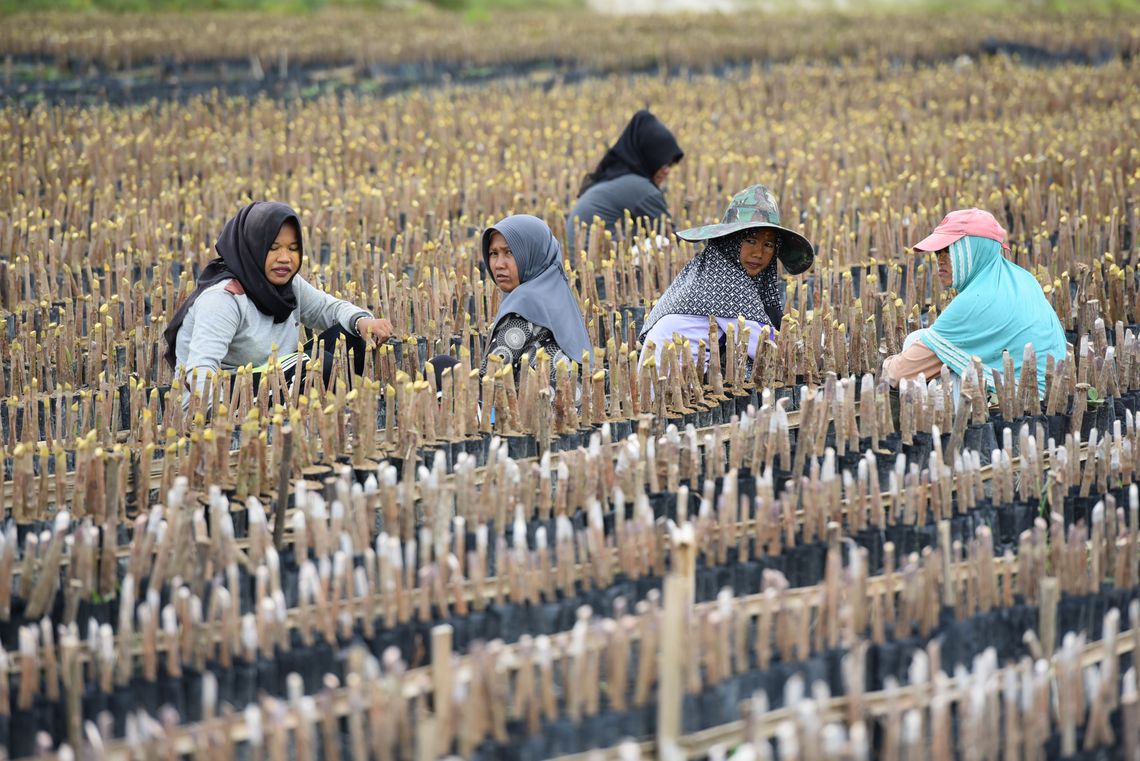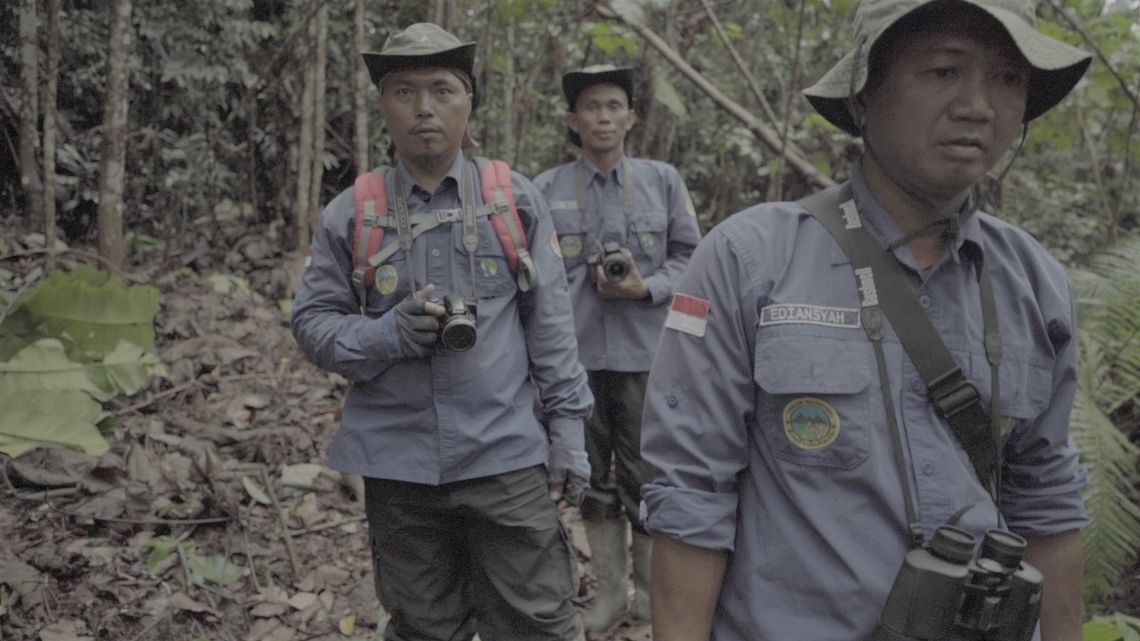Royal Lestari Utama, Indonesia
A challenging and long-term project reflecting Michelin’s All-Sustainable approach by seeking a balance between People, Profit & Planet.
EIGHT YEARS OF commitment TO SUSTAINABLE natural rubber
Since 2015, through Royal Lestari Utama (RLU), which became its subsidiary in July 2022, Michelin has continued to develop an ambitious and long-term pilot scheme, for sustainable rubber tree plantations in Sumatra and East Kalimantan province in Indonesia.
Reflecting its All-Sustainable vision, Michelin wishes to demonstrate with this project a company’s ability to reconcile seemingly opposing issues in an extremely complex context due to the number of stakeholders and the history of this region. It means developing a profitable and beneficial economic activity for all, while having a strong and positive impact on the quality of the environment and on local communities. The Group is proud of the progress made over the past eight years and remains committed, along with the local teams, to the success of this unprecedented initiative.

Michelin’s history is closely linked to natural rubber, a sustainable and infinitely renewable raw material, which creates wealth and jobs.
The Group is aware that the increase in global demand can lead to the development of poor agricultural practices which wreak havoc on tropical forests, biodiversity, and the income of smallholder farmers. For many years now, in collaboration with various partners and NGOs, Michelin has been working towards a more sustainable natural rubber industry, while safeguarding priority ecosystems.
A huge and complex SUSTAINABLE PROJECT
An out-of-the ordinary ambition, encompassing 88,000 hectares with 3 of concessions in Sumatra and Borneo, in regions partially ravaged by unfettered deforestation prior to Michelin’s involvement.
The RLU project is in line with a long-term sustainable development strategy, with the creation of approximately 8,000 direct and indirect jobs and a ‘zero deforestation’ commitment. It aims to promote best practices in sustainable rubber farming, ensuring decent livelihoods for local people with a strong environmental focus: protecting and restoring the tropical forests, natural habitats of Sumatran elephants and tigers, as well as Bornean orangutans living in and around RLU’s concessions Jambi and East Kalimantan provinces.
The launch of this project in 2015 represented a real opportunity for Michelin to make a significative contribution to social, environmental, agricultural, and economic progress in Indonesia’s natural rubber sector. In July 2022, the Group became the sole shareholder of Royal Lestari Utama (RLU), a joint venture set up in 2015 by Michelin and the Barito Pacific Group (BPG). By acquiring its partner’s stake, the Group reasserted its confidence in the project and the necessary long-term vision that it implies. The widely documented and extensive work carried out since 2015 has led to many social and environmental achievements.
DECIPHERING THE PROJECT
The project has three main thrusts: economic, societal, and environmental. It reflects Michelin’s All-Sustainable vision, which places people, particularly local communities, and economic and environmental issues, at the center of its endeavors.
On three concessions, totaling a surface area of approximately 88,000 hectares, rubber trees are planted on nearly 30% of the land. Other 20% of the area is for protection of forests, pioneer vegetation, and set aside areas for conservation.
On the remaining areas, which are currently under the control of communities, we work with smallholder farmers and local governments to establish forestry partnerships scheme where RLU provide technical assistance to rubber farmers. By doing this we ensure the management of the area is in accordance with the regulations and farmers receive better price for their rubber.

RLU’s plantations target the highest standards in the natural rubber value chain, including employment, health and safety conditions, engaging local communities, environmental and biodiversity protection, and the fight against pollution and forest fires.
The project also includes a social dimension, with the constant aim of improving the livelihoods of the inhabitants surrounding the concession and integrate the rubber farmers into the company’s supply chain, by creating secure jobs, training farmers in rubber cultivation and crop diversification.
Social conflicts linked to land use remain a major challenge in the region. The RLU partnership demonstrates that free, prior and informed consent constitutes a continuous and long-term process.
Open and transparent collaboration

Michelin regularly consults its stakeholders and major civil society organizations concerned by issues related to natural rubber. Every two years, the Group brings these organizations together to track progress accomplished along the natural rubber value chain and to identify areas for improvement.
RLU also works with other local experts and ensures that all its operations comply with sustainable development commitments for future generations. The company seeks all constructive opinions which help to ensure a sustainable supply of natural rubber, while protecting the environment and supporting local communities.
The Indonesian project tends to be more exposed than others. Michelin embraces its responsibilities and undertakes to provide transparent and exhaustive information regarding its activities in natural rubber.
MAIN ACHIEVEMENTS TO THE END OF 2024
This is an ambitious and long-term project, emblematic of the Group’s social and environmental commitments. While creating thousands of long-term jobs for local people, RLU has saved thousands of hectares of primary forest, which, without its efforts, would have long since disappeared.
Since 2015, many inroads have been made; the results speak for themselves and are documented:
• Over 10 million rubber trees planted across ~23,500 hectares of the concessions;
• More than 32,000 metric tons of rubber produced in our Kalimantan factory;
• More than 15,000 ha of conservation and biodiversity areas are fully controlled and protected, which is about 20% of the total surface of the concessions; the forests are home to many protected and endangered animals including elephants, tigers, orangutans, gibbons, eagles, and hornbills. In 2024, we published the Buzzling Forests book, showing the rich birdlife found in RLU's forest concession areas, with 238 bird species successfully observed and documented.
• More than 4,000 direct and indirect jobs created ; 30% of these jobs are held by women.
• 5,000 people (employees and their families) live in around 1,200 houses built in villages. We have developed infrastructure within these villages that includes clinics, schools, access to water, electricity, waste management, etc.
• Every year, RLU’s rangers patrol over 70,000 Km in distance - the equivalent of less than two times going around the world - to preserve the forest and biodiversity.
• Introduction of the living wage for all employees from August 2024.
• Over 500 local smallholders, totaling around 1,551 hectares, received technical assistance on their rubber plantation.
Beyond these significant achievements, Michelin remains fully aware of the difficulties that a project of this scale must deal with. The natural rubber value chain remains extremely complex and fragmented; much work remains to be done on a commercial, environmental, and social level. RLU is determined to generate a positive impact and to make ongoing efforts on all fronts: commercial, ESG*, responsible conflict resolution, mitigating human-wildlife conflicts, implementing community partnership programs, and influence.
Through this project, Michelin intends to foster responsible land management, promote best farming and labor practices, and support the development of local populations. The Group remains more committed than ever to developing an exemplary plantation model which includes economic performance, a social dimension and the protection of forests and ecosystems.
Michelin, a pioneer in sustainable natural rubber, was the first manufacturer to make a zero deforestation public commitment in 2015.
Michelin also instigated and is the founding member of the Global Platform for Sustainable Natural Rubber (GPSNR).
In 2022, the Group was the first tire producer to support the inclusion of natural rubber in the European regulation on deforestation-free products.

*Environmental, social and governance issues. RLU and its subsidiaries follow IFC (International Finance Corporation) performance standards in their business conduct.